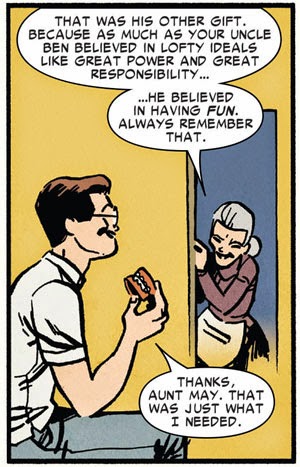R: Detective Comics #585 (April 1988), art by Jerry Bingham
(Click picture to rodent-size)
"The incubator has not done all that it should have done," I said. "Ukridge looks after it, and I fancy his methods are not the right methods. I don't know if I have got the figures absolutely correct, but Ukridge reasons on these lines. He says you are supposed to keep the temperature up to a hundred and five degrees. I think he said a hundred and five. Then the eggs are supposed to hatch out in a week or so. He argues that you may just as well keep the temperature at seventy-two, and wait a fortnight for your chickens. I am certain there's a fallacy in the system somewhere, because we never seem to get as far as the chickens. But Ukridge says his theory is mathematically sound, and he sticks to it."Jeremy's more interested in a chick than a chicken: the lovely Phyllis Derrick. It was love at first sight when he spied Phyllis and her irritable Irish father Professor Derrick on the train down to Dorset, especially since Phyllis was reading The Manoeuvres of Arthur, one of Jeremy's novels. Complications set in (don't they always?) when Ukridge riles up the Professor at a dinner party (much like Basil Fawlty was warned not to talk about the war, Ukridge cheerfully and unconsciously commits the sin of discussing the Irish)—Jeremy is banned from Phyllis's sight, and the resourceful writer must resort to bribing a servant to tip over the Professor's boat in order to save him and win his respect—the sort of plot Bertie Wooster might come up with later on in the Wodehouse canon, with about the same backfiring results. It takes a golf tournament to smooth over the ruffled feathers, but here come Ukridge's creditors, storming down the country lane and demanding payment...
The sun was setting as I left to return to the farm, with Aunt Elizabeth stored neatly in a basket in my hand. The air was deliciously cool, and full of that strange quiet which follows soothingly on the skirts of a broiling midsummer afternoon. Far away, seeming to come from another world, a sheep-bell tinkled, deepening the silence. Alone in a sky of the palest blue there gleamed a small, bright star.In keeping with A Month of Firsts, and perhaps for the very first time in the Wodehouse a Week project, this is the first time I have read Love Among the Chickens. I have only one copy of the book, a nice Herbert Jenkins uniform hardcover reprint from 1963. It may have sat in the bookstore for quite some time, as the initial used book price penciled inside the front cover is "12/6" (twelve shillings and sixpence). It was given to me by my friends Mary and Jay following their trip to London a few years ago. It's a lovely gift and I treasure it greatly, but I'm not certain I'll read it again any time soon. You might say "P. G. Wodehouse: he does chicken right," but on the other hand, while savory, this isn't exactly finger-lickin' good.
I addressed this star.
"She was certainly very nice to me. Very nice indeed." The star said nothing.
"On the other hand, I take it that, having had a decent up-bringing, she would have been equally polite to any other man whom she had happened to meet at her father's house. Moreover, I don't fee altogether easy in my mind about that naval chap. I fear the worst."
The star winked.
"He calls her Phyllis," I said.
"Charawk!" chuckled Aunt Elizabeth from her basket, in that beastly cynical, satirical way which has made her so disliked by all right-thinking people.
